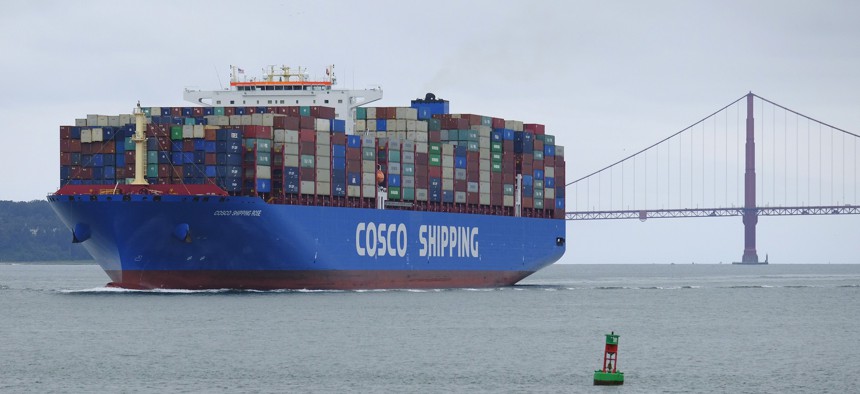States With Most Jobs Losses Due to Trade Gap With China Identified in New Report

A Cosco Shipping container ship passes the Golden Gate Bridge Tuesday, May 14, 2019, in San Francisco bound for the Port of Oakland. (AP Photo/Eric Risberg)
All 50 states have seen jobs eroded as a result of the country’s growing trade deficit with China over the past 20 years, the research found.
Growth in the nation’s trade deficit with China over the past two decades has led to about 3.7 million U.S. job losses spread across all 50 states, with the manufacturing sector taking a particularly hard hit, based on estimates in a report released Thursday.
Trade deficits occur when a country is importing more than it is exporting. The annual U.S. trade deficit with China has expanded by more than $150 billion since the end of 2007, according to the new research by the Economic Policy Institute, a left-leaning think-tank with ties to organized labor.
President Trump signed an initial trade deal with China about two weeks ago, but EPI says that the pact falls short of addressing key issues the group’s research raises.
The report includes estimates for which states have seen the greatest erosion in jobs between 2001 and 2018 due to the trade deficit with China. In terms of jobs displaced as a share of total state employment, New Hampshire tops the list—with 26,100 jobs displaced, or a 3.66% share of the state’s overall employment figure.
States ranking behind New Hampshire include: Oregon (3.64%), California (3.64%), North Carolina (3.23%), Minnesota (3.18%), Massachusetts (3.1%), Wisconsin (3.02%), Vermont (2.93%), Indiana (2.92%) and Idaho (2.82%).
California saw the most jobs displaced, the report says—about 654,100. It is trailed by Texas (334,800), New York (185,100), Illinois (162,400), Florida (150,700), North Carolina (147,700), Pennsylvania (137,300), Ohio (136,700), Georgia (123,200), and Michigan (112,400).
EPI says that about three quarters, or 2.8 million, of the overall job losses due to the nation’s widening trade deficit with China between 2001 and 2018 were in manufacturing. Within that sector, about 1.3 million of the job losses were in the computer and electronics industry.
The report focuses on the trade deficit with goods, as opposed to goods and services. Overall, it says, the U.S. goods trade gap with China grew to $419 billion in 2018 from $83 billion in 2001.
“A fundamental transformation of the U.S.–China trade relationship is long overdue,” said EPI’s president Thea Lee in a statement. “The top American trade priority must be to address the structural roots of the imbalanced and unfair trade relationship with China.”
Lee went on to point to concerns with currency values, Chinese government subsidies to industry and workers rights in China.
EPI traces the trade imbalance back to China’s 2001 entry into the World Trade Organization.
Proponents of that move at the time of those negotiations, including Democratic President Bill Clinton, framed the arrangement as a “win-win” that promised to boost U.S. exports to China, the report notes.
It goes on to blame “trade-distorting practices” by China (like state-owned enterprises, as well as subsidies to makers of steel, paper and concrete), along with “currency manipulation” and subpar labor rights, for unleashing a flood of Chinese goods into global markets.
Meanwhile, domestic demand for goods within China has lagged, the report says, limiting opportunities for U.S. exports there.
Trump has taken a standoffish approach to trade with China, imposing tariffs on billions of dollars of imports from the country. But trade deficits with China and resulting job losses continued to expand during the president's first two years in office, the EPI report says.
Under the “phase one” trade deal the two countries reached earlier this month, China pledged to increase imports of American goods and services by at least $200 billion, the White House said.
The agreement includes other provisions as well. Some are meant to address intellectual property concerns having to do trade secrets, trademarks and counterfeit goods. Others pertain to issues like currency valuation, as well as Chinese barriers to U.S. food and agricultural exports and American financial services firms.
A full copy of the EPI report can be found here.
Bill Lucia is a Senior Reporter for Route Fifty and is based in Olympia, Washington.
NEXT STORY: Is Workplace Rudeness On the Rise?






